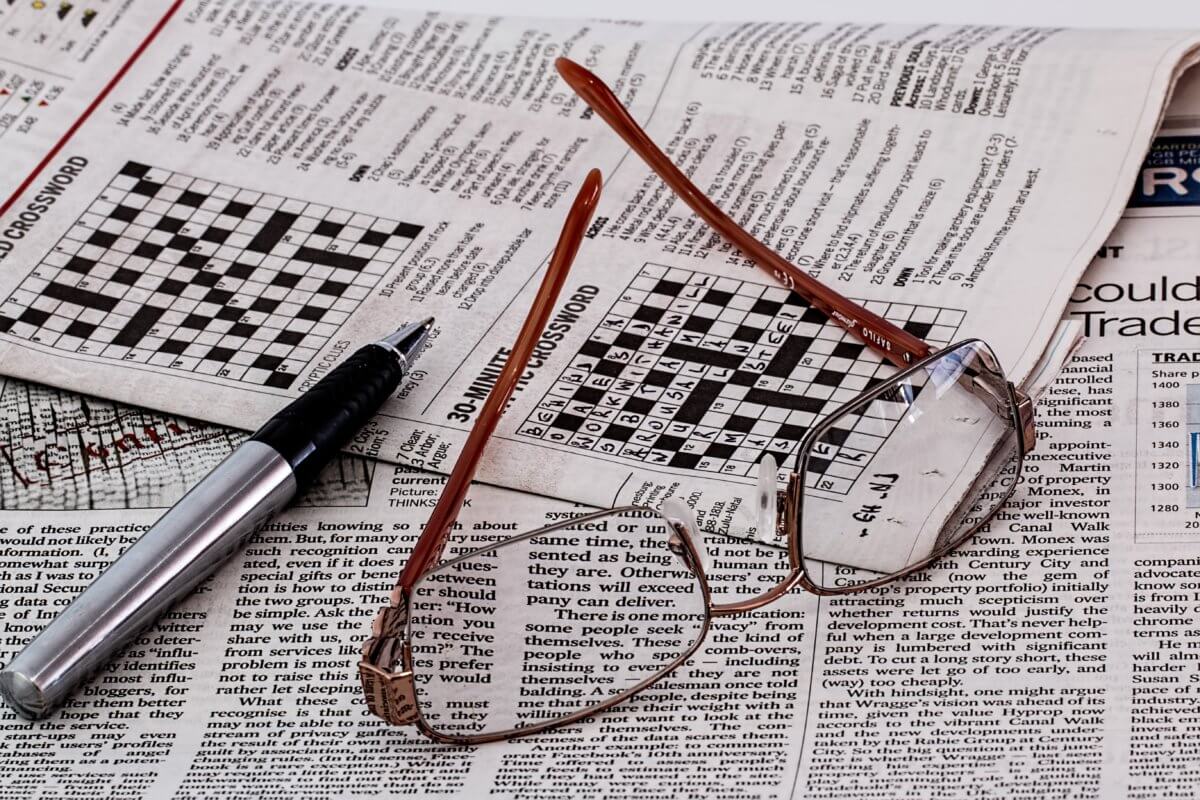When do our habits become our legacy?
My grandma used to have the daily paper thrown onto her front lawn every morning. She would sit on the couch by the window and read, circling the occasional spelling mistake in black pen, then do the crosswords. I remember sitting next to her, trying to help with the word jumbles, and brainstorm answers to tricky clues. Sometimes a topic I knew well would come up, animals, gemstones, classical mythology, and in excitement I would blurt out a list of possible words. She would humour me, though normally the gemstone would end up being RUBY, and the snake an ASP.
This pattern was often the case, and I remember being in awe of how Nan seemed to know what many of the words would be purely through practice. ‘To make lace’ was always TAT, ‘Cult’ was always SECT. You see the thing with crosswords is that they are harder to make than they are to solve. The people who create them have their own little toolbox of useful words. Short words with common vowels that can fill a gap, or pieces of obscure vocabulary that they find fun to include. If you solve the crosswords written by the same person enough, you start to notice their style, and get a peculiar insight into how they see language and the world.
One thing that always intrigued me as a child were the cryptic crosswords. They seemed so bizarre, this list of nonsense sentences among all the straightforward synonyms. Often Nan and I would start reading the clues out to each other and laughing. One day when I was around 11, I read about how cryptic crossword clues were made, and to my delight discovered there was a method hidden in the cacophony of words. Rather than try to use this knowledge to solve the cryptic crossword that day, I decided instead to write my own. I drew up a grid, and wrote some rather obvious clues, plus a couple that were so tangential they didn’t even make sense. Then I took the crossword to my grandma’s house.
I was halfway through writing this when I found out nan had passed away. It isn’t sudden, and indeed my reason for writing this was originally to reflect on how even though dementia and old age have taken a lot of her sharpness, so many of my memories will be of her teaching me things, solving puzzles, and lots of laughter. Now I find myself having to regard those memories as even more precious, because there will no longer be any more.
The day I took her the cryptic crossword I had written she was delighted, and sat and patiently solved all my clues. This was how I always remember her being, constantly encouraging me to learn and embrace my love of words and knowledge. Long since retired before I was born, she had been a primary school teacher. All through my childhood her passion for education and learning shepherded me. I remember her taking me to the library to borrow picture books. Or creating games to teach me to read and do basic arithmetic. Every year on my birthday she and my granddad would buy me a ‘true book’, encyclopedias, almanacs, books of fun facts, a beautiful dictionary and thesaurus. I still have the globe of the world they gifted me, the stacks of national geographic magazines they subscribed me to, and the postcards from all over the world nan would lovingly write when they travelled.
When you lose someone, you remember the times you had with them. I think the hardest thing about seeing nan deteriorate was that there was a sense of guilt and loss in reminiscing of times spent with her before she got ill. As if I was mourning her while she was still alive, and doing her a disservice by focussing on the past when I should have been treasuring the present. Now she is at peace, and I can remember, with tears, or with wistful smiles.
The lunches we would have, at various cafes around Milton and Ulladulla, and rank various aspects of the food, ambience, and service, in a little notebook. Playing at being restaurant critics, for something to giggle about. Or the lunches where we would sit in nan’s house and have a feast of party pies, and fish and chips, and watch murder mysteries on tv.
I guess habits become our legacy when they capture a part of our personality that is treasured by those who loved us. It is the nature of memory that the things oft repeated are the ones that will stick in our minds. Our habits, our quirks, the little traditions we create with each other, they make up the tapestry of memories that remain of us with the people we leave behind.
Don’t worry nan, I’ll keep doing crosswords for you.
We acknowledge the Ngunnawal and Ngambri people, who are the Traditional Custodians of the land on which Woroni, Woroni Radio and Woroni TV are created, edited, published, printed and distributed. We pay our respects to Elders past and present. We acknowledge that the name Woroni was taken from the Wadi Wadi Nation without permission, and we are striving to do better for future reconciliation.
